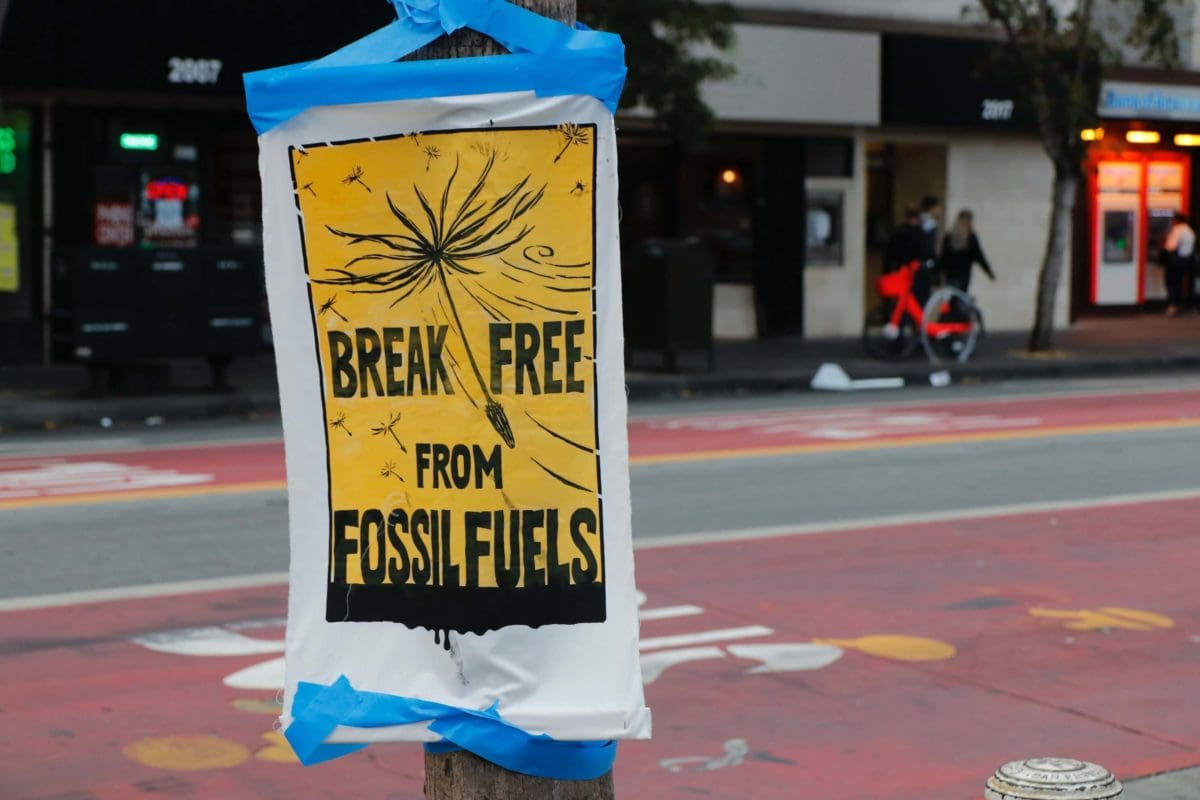
What Is Fossil Fuel Divestment? (Why Does It Matter?
As a supporter of the environment and the battle against climate change’s adverse effects, you know how crucial certain business decisions can be. As a result, many institutions and organizations have joined the fossil fuel divestment movement in the last decade, pivoting toward more eco-friendly alternatives. But what is fossil fuel divestment, and why do institutions bother to make the pledge?
- What is Fossil Fuel Divestment?
- Why Do Organizations Invest in Fossil Fuels?
- Getting Behind Organizations Against Fossil Fuels
- Does Fossil Fuel Divestment Work?
- Unity Environmental University, the First Higher-Ed Institution to Fully Divest
What is Fossil Fuel Divestment?
Organizations and institutions invest their money in the fossil fuel industry by purchasing stocks and bonds. These investments generate income for both the investor and the industry. To divest in the fossil fuels industry means that an organization is getting rid of its investments – essentially ending its relationship with fossil fuels.

What is Divestment?
Let’s be clear on how we define divestment: Divestment is the opposite of investment. While investing in an asset or industry requires purchasing stocks and other investments – divesting requires selling or otherwise getting rid of those investments.
In most cases, divestment in an asset is for financial gain. However, divestment in the oil and gas industry is often an ethical choice. Entities that choose divestment from fossil fuels take a critical stand against the industry’s harmful practices and environmental impact.
What are Fossil Fuels?
Fossil fuels are naturally occurring resources found on or below the earth’s surface. However, these resources aren’t infinite, and the extraction methods required to gather fossil fuels cause irreparable damage to the environment. Reliance on fossil fuels as a source of energy contributes to global warming.
- Coal: Coal is a rock that produces heat energy when burned and emits massive carbon emissions into the atmosphere. Mining for coal is dangerous, disruptive, and causes extreme pollution.
- Crude Oil: Also called petroleum, crude oil is collected from sedimentary rock or tar sands. It is composed mainly of hydrocarbons and requires extensive refining. Transporting crude oil causes pollution and can result in massively damaging oil spills.
- Natural Gas: Natural gas is primarily methane from underground. Depending on the type of natural gas, extraction methods include either conventional drilling or the more damaging fracking.
So then, What Does It Mean to Divest from Fossil Fuels?
Fossil fuel divestment is the intentional act of moving one’s money and investments out of the fossil fuel industry. Institutions that sell or get rid of their fossil fuel stocks and investments can then invest in renewable energy and other environmentally-friendly initiatives.

The more entities that join the divest movement, the more pressure is put on the fossil fuel industry and its investors. When enough money is taken from the fossil fuel industry for good, we can progress towards clean energy and programs that benefit the environment.
Why Do Organizations Invest in Fossil Fuels?
Unfortunately, many organizations still invest in fossil fuels today. There is still a lot of money to be made by investing in fossil fuels because fossil fuels are still used as energy sources worldwide. Banks and financial institutions, in particular, are known to still invest heavily in fossil fuels.
Combating this trend with fossil fuel divestment is necessary. The reliance on fossil fuels will end when other renewable energy sources are available. When the people and industries pushing for fossil fuel usage no longer have the money streaming in, their power will be quickly limited.
The Cons of Fossil Fuels
The negative impacts of our reliance on fossil fuels until this point is obvious. Climate change, pollution, public health, and damage to ecosystems are the main cons of fossil fuels. The business entities who still invest fully in fossil fuels are accountable for their continued support of this irreversible harm.
- In the U.S., burning fossil fuels accounts for about 75% of greenhouse gas emissions (the leading cause of climate change).
- Since the Industrial Revolution began nearly 150 years ago, oceans have become about 30% more acidic thanks to carbon emissions from fossil fuels.
- Coal-burning power plants account for 44% of dangerous man-made mercury emissions in the U.S.
- In 2018, air pollution from fossil fuels was deemed responsible for over 8 million deaths worldwide.
- Extreme weather each year caused by climate change is devastating to ecosystems (the 2019-2020 Australian bush fires killed or displaced about 3 billion animals).
Why Organizations Divest in Fossil Fuels
Organizations divest in fossil fuels for many reasons. For example, their customer base may proclaim that they want to see a fossil-free campaign. Or, these organizations may want to remove their money from the fossil fuel industry to deny support and capital from companies they see as harmful.

Either way, these organizations weigh the pros and cons of investing in fossil fuel and find that removing their money from the oil and natural gas industry is the right thing to do. By choosing this path, they can invest in clean energy and make significant changes toward a better future.
Getting Behind Organizations Against Fossil Fuels
It’s important to show support to organizations that take a stand through divesting from fossil fuels. Choose to invest money in environmentally and socially responsible financial institutions when possible. But don’t be fooled by organizations that claim to be conscious without doing the work.
Universities Divesting from Fossil Fuels
Ethics play a significant role in universities divesting from fossil fuels. University students expect higher education institutions to invest in a healthy future for graduates, not abuse their planet. Here are some notable colleges and universities that no longer invest in fossil fuels companies.
- 2012: The Board of Trustees at Unity Environmental University votes unanimously to fully divest from fossil fuels, making it the first higher educational institution to do so.
- 2021: Harvard University states that its investments in fossil fuels would cease, leading to an eventual full divestment.
- 2020: Oxford University announced it would increase its restriction on fossil fuel investments by fully divesting from the industry.
- 2018: The University of California system fully removed fossil fuels from its investment portfolio.

Ready To Learn More About Unity Environmental University?
Companies That Have Divested
Companies often divest from fossil fuels in favor of more sustainable ventures. Usually, a company’s customer base may indicate that they want to see clean energy practices, or the company executives might have personal feelings on the subject.
- The global insurance company MetLife committed to divesting coal and oil sands before the end of 2020.
- Vermont, US-based Solar B-Corp SunCommon fully divested its 401k portfolio from fossil fuels in 2015.
- The public health organization, American Public Health Association (APHA) fully divested from fossil fuels in 2017
- In 2014, the Ben & Jerry’s Foundation committed to the Divest-Invest initiative by fully divesting from fossil fuels.
Banks Divesting from Fossil Fuels
Banks are the slowest entities in the U.S. to move toward carbon divestment. Because there is still so much money wrapped up in fossil fuels, it’s no surprise that banks are still investing. However, as more global banks continue to divest, we expect to see U.S. banks follow suit.
- Pi Investments is an investment firm committed to the philanthropic DivestInvest initiative in 2017, fully divesting from fossil fuels.
- The American Amalgamated Bank committed to going fossil-free with its investments in 2016.
- In 2020, Larry Fink, CEO of investment firm BlackRock, wrote an open letter to CEOs advising them to divest from fossil fuels, especially coal, along with his firm.
- The Swiss Bank J. Safra Sarasin committed to a sustainable plan to divest from coal in 2017.
Does Fossil Fuel Divestment Work?
With more and more entities choosing to offload investments from fossil fuels every year, research has found that the movement has a clear positive impact. Every organization that commits to pulling its money out of fossil fuels causes the oil and gas industry to lose another avenue of capital. More people are concerned now than ever about the prevailing climate crisis. When enough interested parties learn how to avoid fossil fuels altogether, the energy sector can fundamentally change.
The Impact of Fossil Fuel Divestment
The anti fossil fuel movement empowers individuals and mainly began with student groups in universities, proving that social change is possible from the bottom up. One of the most significant impacts of this movement is the widespread stigmatization of fossil fuels in public discourse.

Other tangible effects of divesting in fossil fuels include:
- According to the Global Fossil Fuel Divestment Commitments Database, the value of institutions divesting from fossil fuels is about $39.88 trillion.
- According to Reuters, fossil fuel investments have dropped 20% in value over the last decade.
- The dirtiest fossil fuel, coal, has become increasingly uninsurable as insurers withdraw coverage thanks to the Inside Our Future (formerly Unfriend Coal) campaign.
Unity Environmental University, the First Higher-Ed Institution to Fully Divest
Unity Environmental University made a historic decision in November 2012 to become the first U.S. college to divest from fossil fuels. By 2017, America’s environmental college saw higher than expected returns. Since then, many other higher-educational institutions have jumped on board with divestment commitments of their own.
Now, Unity Environmental University is celebrating ten years of divestment. Unity is committed to providing students with a world-class education centered around environmental science and climate change.



